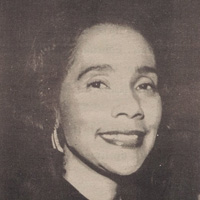
Two decades after Dr. Martin Luther King, Jr., delivered his “I Have a Dream” speech before a quarter million people gathered at the Lincoln Memorial, his widow, Coretta Scott King, spoke during the annual ECU Black Arts Festival on her late husband’s living legacy. Mrs. King’s remarks were delivered before a capacity audience in Mendenhall Student Center’s Hendrix Theatre, January 31, 1983. At the time, Mrs. King was serving as the head of the King Center for Nonviolent Social Change in Atlanta, an organization she had founded to advance the struggle for nonviolent social change.
Later, the same year – the fifteenth anniversary of King’s assassination on April 4, 1968 – U. S. President Ronald Reagan signed legislation honoring Dr. King with a national holiday (third Monday of January). At the signing ceremony, Reagan, with Mrs. King at his side, observed that Dr. King had “stirred our nation to the very depths of its soul” in fighting racial discrimination. Reagan added that the new national holiday would serve as a reminder to all to follow King’s teachings: “Thou shalt love thy God with all thy heart and thou shall love thy neighbor as thyself.”
At ECU, Mrs. King told her audience that her late husband’s “legacy begins with understanding that nonviolence is the most revolutionary force ever devised.” She added that the nonviolent movement was “the most viable method for oppressed people to gain their full citizenship rights, for equal opportunity, and for developing nations of the world.” Regarding Dr. King, she noted that “he didn’t start the Civil Rights Movement, but he gave leadership to it.” Reportedly, he received his “motivation, inspiration, and techniques from God.” Mrs. King encouraged the audience to seek God and discover him, because without him, one can only live a meaningless dream.
Mrs. King praised the recently released movie, Gandhi, noting how it had sparked new worldwide interest in the struggle for nonviolence. She encouraged the audience to see the movie, noting that it would help them understand the “power of nonviolence,” her late husband’s movement, and why he was so effective in his movement. Dr. King was a student of Mohandas Gandhi’s (1869-1948) teachings on nonviolence (ahimsa) and “grasping moral truth” (satyagraha). In the early 1960s, King reportedly identified Gandhi as “the guiding light of our technique of nonviolent social change.”
Mrs. King added, “Martin believed America had the moral capacity and the natural resources to really make it a great nation and he challenged the nation to develop a sense of compassion to move America to equality and justice, and that challenge is still before us, not only in America but worldwide.” She added that her husband’s message is one for the entire world insofar as it is “a message which means peace, justice, and opportunities for the quality of life for all people.”
In 1969, SOULS had demanded, among other things, more black speakers on campus. Of the many who later spoke, Mrs. King was the most prominent. One year after her talk, ECU’s celebration of the nation’s first Martin Luther King holiday was all the more heartfelt due to her visit the year before. Ebony Herald made sure that the day did not go unnoticed, devoting its January 1984 issue to the celebration. With its front-page headline, Ebony Herald conveyed the closeness many felt for the fallen leader by wishing Dr. King “Happy Birthday.” The paper also featured several essays recording reflections on King’s significance in history. Although Dr. King never came to Greenville, his widow’s campus lecture brought life to his legacy in 1983 and for years to come. In hosting Mrs. King, ECU once again contributed to the cultural leavening of the region as it moved away from its Jim Crow past and towards a more peaceful and inclusive future.
Sources
- "Happy Birthday." Ebony Herald. January 1984. P. 1. https://digital.lib.ecu.edu/56998.
- Ingram, Ruben. "Remembering King." Ebony Herald. January 1984. P. 4. https://digital.lib.ecu.edu/56998.
- Minority Arts Committee. "Mrs. King Comes To ECU." Ebony Herald. January 1983. P. 1. https://digital.lib.ecu.edu/56995.
- Theroitch, David. "Minorities Gaining More Unity." Ebony Herald. January 1984. P. 4. https://digital.lib.ecu.edu/56998.
- Wiggins, Vicky. "King Stresses Non-Violence Today." Rocky Mount Telegram. February 1, 1983. P. 9.
- Williams, Shirley. "A Time To Laugh And A Time To Cry." Ebony Herald. January 1984. P. 2. https://digital.lib.ecu.edu/56998.
Citation Information
Title: Coretta Scott King at ECU, 1983
Author: John A. Tucker, PhD
Date of Publication: 7/18/2019